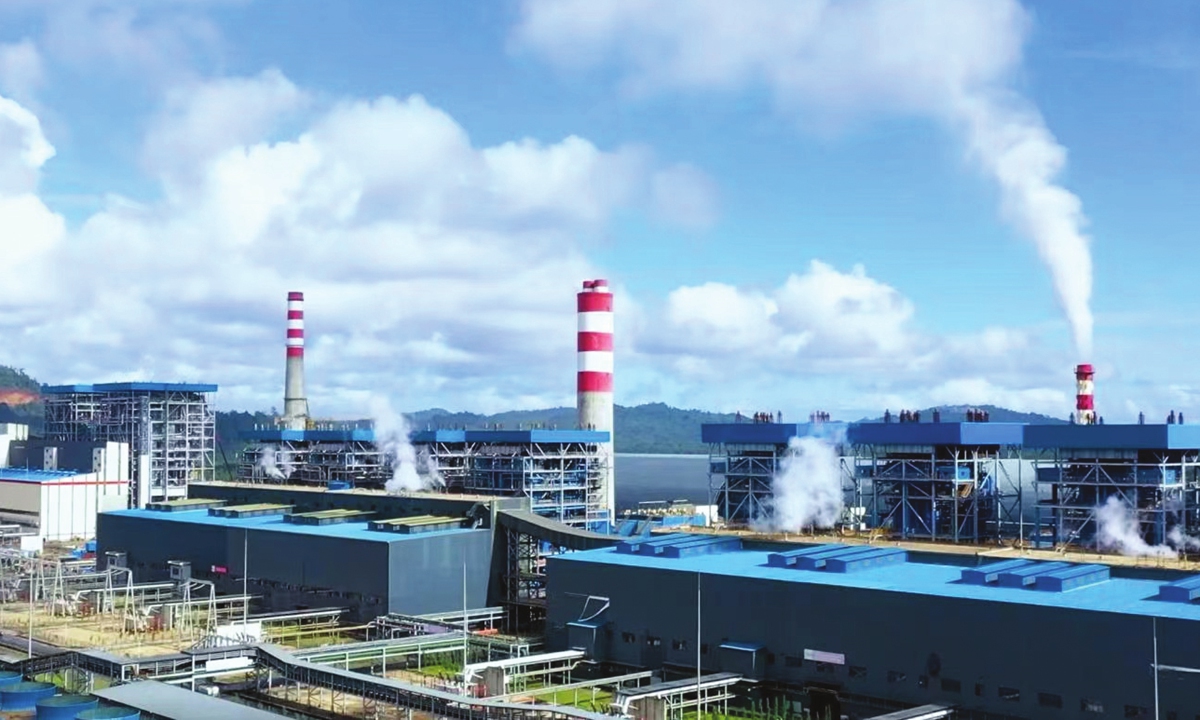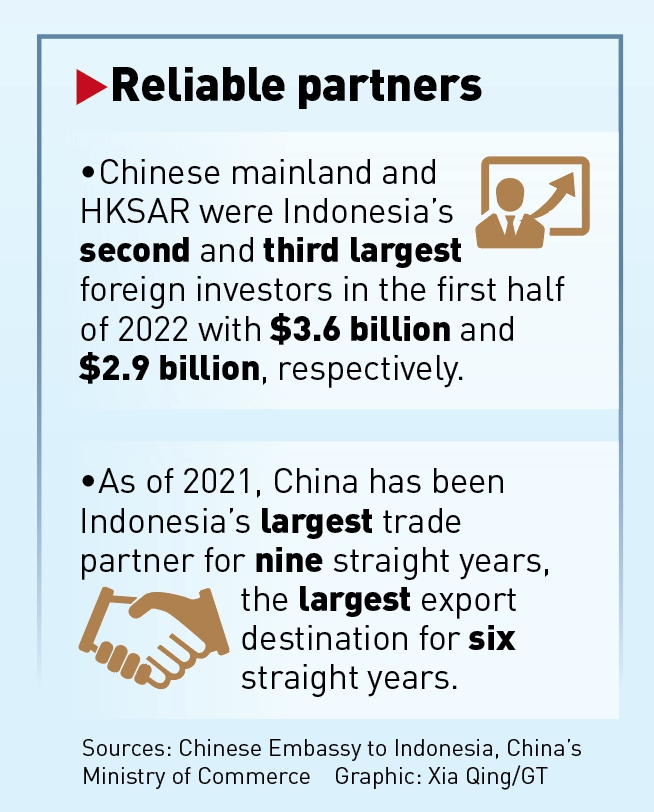Editor's Note:Chinese President Xi Jinping proposed the 21st Century Maritime Silk Road - an important component of the Belt and Road Initiative (BRI) - back in 2013 during a state visit to Indonesia. The alignment of the proposal with Indonesia's Global Maritime Fulcrum strategy has witnessed robust growth of bilateral economic cooperation in recent years, demonstrating great resilience and vitality. China has become the largest trade partner for Indonesia for nine consecutive years, while Chinese enterprises' investment has made remarkable contribution to local development.
This is the second in a series of articles scoping the developing of the BRI in ASEAN members.

View of China-invested Virtue Dragon Nickel Industry Park at Southeast Sulawesi Province of Indonesia Photo: Virtue Dragon Nickel Industry Park Co
Amid the robust development of bilateral economic ties facilitated by the Belt and Road Initiative (BRI), economic cooperation between China and Indonesia has been strengthened over recent years. Indonesia has become the second-largest destination for Chinese investment in ASEAN, with Chinese enterprises' investment in the island country covering a wide range of sectors including mining, industrial parks and manufacturing. Continued cooperation has yielded fruitful results, with further potential to be unleashed in new energy, maritime cooperation and the digital economy, among other areas.
Situated in Southeast Sulawesi Province of Indonesia, Virtue Dragon Nickel Industry Park is a demonstration of economic cooperation between China and ASEAN members.
"It is the first nickel and stainless steel industrial park invested in by China's Jiangsu Delong Nickel Industry Co in Indonesia," Zhou Yuan, general manager of the park told the Global Times. Starting from 2015, a total of three phases have been constructed, of which the first- and second-phase facilities have been listed as key projects under the BRI in addition to being an Indonesian national strategic project, he said.
According to Zhou, the industrial park has paid a large amount of tax to local government, created nearly 40,000 jobs for local residents and brought about numerous opportunities for small businesses.
As Indonesia has grown from an exporter of nickel ore that lacked an industrial production capacity to a global producer of nickel and stainless steel, large projects invested by Chinese enterprises are indispensable for Indonesia's nickel industry upgrade. They contributed to Indonesia's in-depth participation of global stainless and new energy industrial chain with its abundant nickel resources.
"The park's nickel and stainless output is expected to double this year, and we are also making plans surrounding power batteries used for new-energy vehicles," Zhou said, noting that there is huge potential for in-depth cooperation between the two countries in nickel processing.
Two-park cooperationAs Indonesia has huge population, rich fishing and agricultural resources, transforming and upgrading its export-oriented and labor-intensive manufacturing industries is meaningful for facilitating local economic growth and improving standards of living.
In 2019, East China's Fujian Province proposed a joint project called "Two Countries, Twin Parks" between China and Indonesia, which aims to develop five cross-border industrial chains including marine fishery, tropical agriculture, light industry and textile, machinery and electronics and green mining. Fully utilizing the complementary characteristics of Fujian Province and Indonesia, the project will boost win-win cooperation while also serves as an important platform for enhancing Fujian's opening-up.
Currently, the two sides have been actively advancing the project. China designated Yuanhong Investment Zone in Fuqing as the Chinese park, and Indonesia, under a "one park, multiple estates" scheme, selected Bintan Industrial Estate, Aviarna Industrial Estate and Batang Industrial Estate collectively as the Indonesian park.
Since its launch, cooperation has grown between the Yuanhong Investment Zone and three industrial parks in Indonesia.
"As of now, a total of 36 projects with investment worth 19.8 billion yuan ($2.8 billion) in total have been established, whereas the construction of another 23 projects has been taking pace," Lin Youhua, executive deputy director of the Fuqing Functional Zone Management Committee of Fuzhou New Area, told the Global Times. For instance, Saneheld (Fuqing) Food Co has reached an agreement with Indonesia's Salim Group on the construction of 10 marine fishery centers in Indonesia, and the first fishery base with an annual output of 500,000 tons has entered services.
In addition, the Chinese side has been exploring innovative measures, including financial services, customs convenience and research and development cooperation for the release of more dividends and facilitating the development of the project, Lin said, noting that Fuzhou customs has formed a working group focused on opening up a green channel for customs clearance under the "Two Countries, Twin Parks" framework.

Graphic: Xia Qing/GT
Digital upgradeChinese enterprises including China Mobile International (CMI) and Tencent have been engaging with Indonesian telecommunications carriers to help build "Digital Indonesia," cultivating new growth in digital economy.
Aiming to become an information communication bridge between China and Indonesia, CMI is participating in the construction of digital infrastructure in the country, assisting in the training of local talent, providing iSolutions - one-stop enterprise solutions for different industries - and promoting the development of local digital economy.
"CMI actively promotes the construction and development of digital infrastructure, and three Point of Presence (PoPs) have been built and put into use in Indonesia, providing services for local enterprises to connect to a global network," Zhang Dong, managing director of China Mobile International Indonesia, told the Global Times. In addition, the firm works with local partners to create a one-stop data center service and provide access network solutions for industrial parks in remote areas. Its integrated iSolutions enterprise service portfolio further helps local enterprises to expand business globally.
Since April 2021, Tencent has launched its first Internet Data Centre in Indonesia, providing global access and a rich array of services to governments and organizations that need advanced infrastructure and a resilient environment, such as those in the online games, live broadcast and financial services sectors, further emphasizing its commitment to addressing the ever-growing business needs in Indonesia and Asia-Pacific region.
"Indonesia has a large territory, rich mineral resources, a large and young population, with great market potential. It is a very promising market, and we are very optimistic about the further development in the market," Zhang said.





